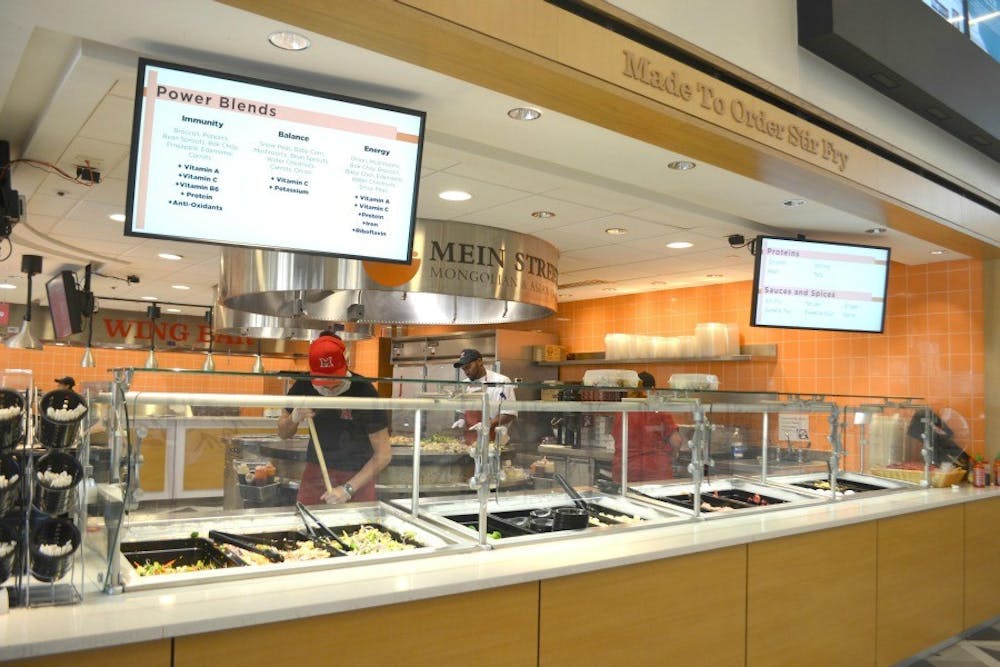By Tess Sohngen, Senior Staff Writer
A number of housing and dining employees at Miami say the university falls short in the compensation and treatment of its workers.
The mean starting salary for Miami janitorial staff and cleaners in 2015, $10.16 per hour, falls within the lowest 10th percentile among national averages for the profession -- $13.97 per hour -- according to the Bureau of Labor Statistics.
Food preparation and serving-related occupations at colleges, universities and professional schools have an average wage of $15.57 per hour and $32,380 annually, according to the Bureau of Labor Statistics.
Miami University's average gross pay for Food Service Assistants, calculated by the Dayton Business Journal, was $15,486.28, ranging from $78.74 to $37,439.82.
Members of Miami's local American Federation of State, County and Municipal Employees (AFSCME) chapter, a branch of the national public service employee union, are currently negotiating with the university on a new contract. The most recent negotiations were three years ago.
"Both sides have agreed not to discuss matters during the negotiation," said Claire Wagner, Director of University News and Communications.
Dustin Jones, the AFSCME Local 209 President, said he was unable to comment because of a gag rule on the ongoing negotiation.
Low wages are not the only issue Miami workers want to address. Mistreatment of employees, especially in Housing and Dining Services, is a common concern of many long-time employees.
"[Everyone] wants out of dining because they're treated poorly," said Joanne, a Miami employee who spent the first 17 of her 18 years at Miami working in dining services and agreed to talk under terms of anonymity. "It's better for me because I got out of Housing and Dining."
After 16 years at Miami, Joanne was told by her new manager to assist in training a new, younger employee how to set up the salad bar and carts for the morning shift. Joanne happily helped the new employee, but soon after, her manager gave the new employee Joanne's early shift and switched Joanne to the late shift.
Joanne went to AFSCME for help getting her shift back, but her faith in how Miami treats its employees was broken.
"I'm the first person they did it to," Joanne said. "Now watch them do it to others."
She said that a friend working in dining was recently that she could be called in for any shift on any day.
"They treat their employees bad," said Joanne.
Joanne makes $12.48 an hour. The national average for hourly income for her job is $13.30 an hour.
"They used to call it Mother Miami because they took care of you," said Michael, a maintenance employee at Miami whose name was also changed. Now, he says Miami is all about the money.
"For every raise they give us, they find a way to get it back," said Michael. "They seem to think of every spot to raise revenue."
Miami dining employees used to receive two meals for the price of three or four dollars. Now, they are allowed only one meal for the same price. Michael added that prices for health insurance and parking have also increased, making the wage increases Miami employees receive seem futile.
When Joanne started working at Miami in 1998, she didn't have to pay for health insurance and parking. Now, a parking pass split between two carpooling employees costs $30 for the school year -- a special carpooling alternative to the $75 parking pass for an individual. Insurance still costs less than $100 per month, which is the main reason why Joanne continues to work at Miami.
Michael continues to work at Miami so his children can afford to attend Miami, but he nearly lost his job two years ago.
"They wanted to fire me two years ago, but the union stopped it," he said.
Meanwhile, Michael was looking for another job in Hamilton City Schools, where the starting salary was 10 cents more than what Miami was paying him.
Another dining employee who agreed to speak on terms of anonymity, David, said that most of the incidents of mistreatment he experienced have been from his coworkers.
"If you don't fit the bill, the full-time employees will treat you like shit," said David, who has worked in three different dining centers at Miami.
Other cooks would spread rumors about David to student employees and sometimes shout at him in front of students. A past boss tried to "set him up for failure" several times and became rude toward David after David would fix the situation he was meant to fail.
When they discovered the mistreatment, dining management often reassigned the co-worker.
When David had to go to Roudebush Hall after a complaint was filed against him, Miami's union was there to help. Although thankful for the union's help, David said he disliked the methods it took to defend him at the hearing and would ultimately not join a union.
David said that a lot of employee dissatisfaction stems from the clique-like atmosphere in dining services, union tension and low wages.
"There is a lot of frustration in dining."

